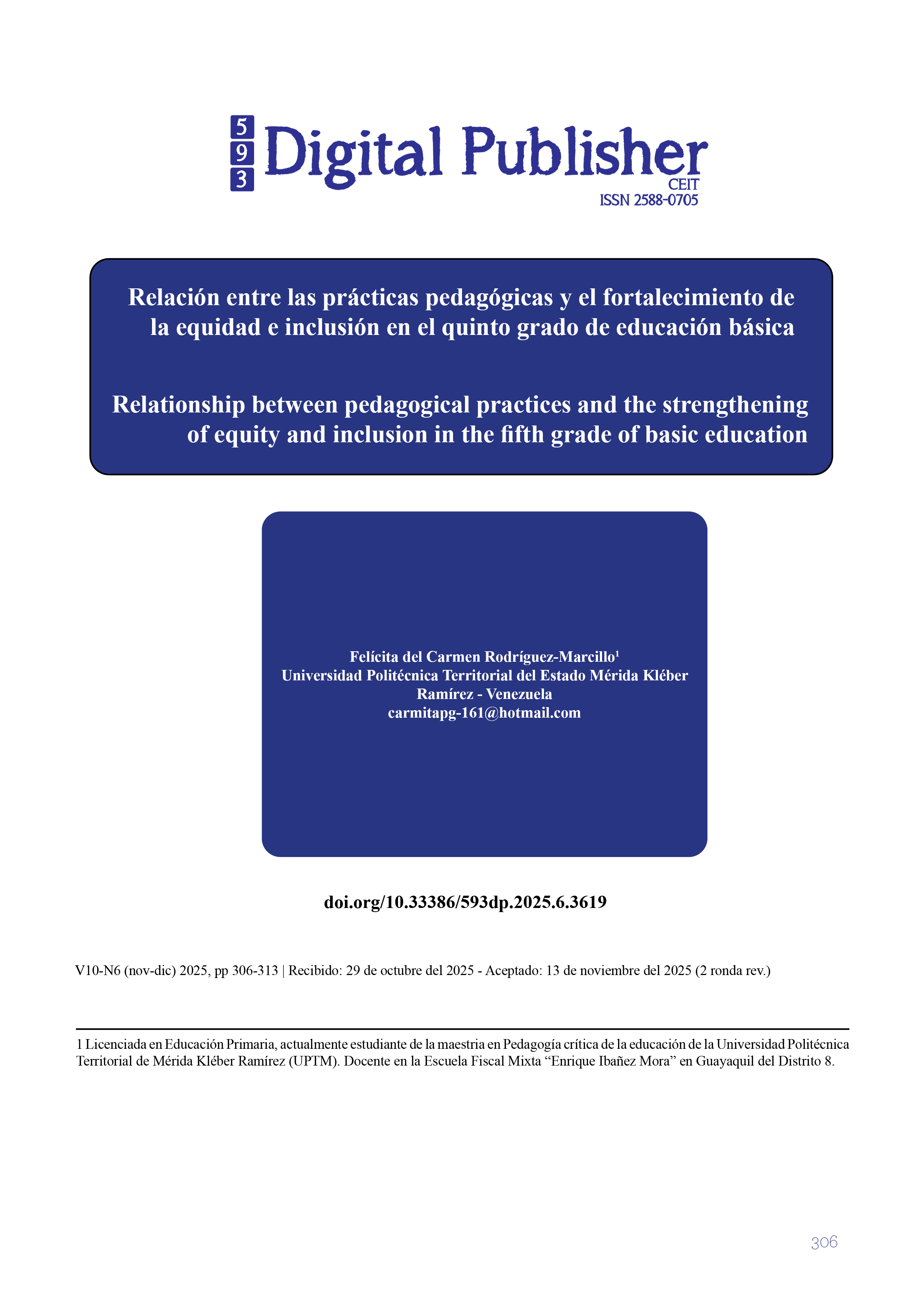Relationship between pedagogical practices and the strengthening of equity and inclusion in the fifth grade of basic education
Main Article Content
Abstract
The present study aimed to examine the relationship between pedagogical practices and the strengthening of equity and inclusion in fifth-grade basic education through the integration of Information and Communication Technologies (ICT). The study explored how classroom practices can contribute to reducing inequality and enhancing educational equity in fifth-grade students. A mixed-methods approach was adopted, combining quantitative and qualitative methods under a multiple case study design in institutions with diverse socioeconomic and cultural contexts. Classroom observations, semi-structured interviews, focus groups, and document analysis were conducted, and data were triangulated to understand teaching practices, perceptions of inclusion, and the pedagogical use of ICT. The results revealed a positive impact of technological tools on student access and participation, as well as on the development of autonomy and motivation among learners. However, gaps were identified between technological access and its pedagogical use, mainly due to limited teacher training, curriculum overload, and insufficient institutional support. Even so, the combination of ICT with critical strategies—such as project-based learning, cultural contextualization, and participatory assessment—generated inclusive environments that fostered reflection and the collective construction of knowledge. In conclusion, the research demonstrates that educational equity does not depend solely on the availability of technological resources, but on teachers’ ability to use them through a critical pedagogy that promotes social justice, dialogue, and participation. It is recommended to strengthen teacher training in the critical use of ICT, design context-responsive strategies, integrate cultural diversity into educational content, and promote participatory assessments that ensure continuous improvement in learning.
Downloads
Article Details

This work is licensed under a Creative Commons Attribution-NonCommercial-ShareAlike 4.0 International License.
1. Derechos de autor
Las obras que se publican en 593 Digital Publisher CEIT están sujetas a los siguientes términos:
1.1. 593 Digital Publisher CEIT, conserva los derechos patrimoniales (copyright) de las obras publicadas, favorece y permite la reutilización de las mismas bajo la licencia Licencia Creative Commons 4.0 de Reconocimiento-NoComercial-CompartirIgual 4.0, por lo cual se pueden copiar, usar, difundir, transmitir y exponer públicamente, siempre que:
1.1.a. Se cite la autoría y fuente original de su publicación (revista, editorial, URL).
1.1.b. No se usen para fines comerciales u onerosos.
1.1.c. Se mencione la existencia y especificaciones de esta licencia de uso.
References
Althubyani, A. R. (2024). Digital competence of teachers and the factors affecting their competence level: A nationwide mixed-methods study. Sustainability, 16(7), 2796. https://doi.org/10.3390/su16072796
Alvarado Ponce, J. M. (2023). Uso de las TIC y su impacto en el aprendizaje de educación básica media: Proyecto educativo con blog interactivo [Tesis de licenciatura, Universidad de Guayaquil].
Aparicio Gómez, O. Y. (2019). El uso educativo de las TIC. Revista Interamericana de Investigación, Educación y Pedagogía (RIIEP), 12(1), 23–38. https://doi.org/10.15332/s1657-107X.2019.0001.02
Arias Sánchez, L. S. (2022). Uso de las TIC para mejorar los procesos de enseñanza-aprendizaje en estudiantes de educación básica. Ciencia y Educación, 3(2), 45–58. https://doi.org/10.5281/zenodo.15576809
Carrión Arias, N. J. (2024). Estudio documental sobre el uso de TIC en la educación básica: Evolución y tendencias. Sage Sphere Multidisciplinary Studies, 2(1), 15–28. https://doi.org/10.63688/8
Castillo Armijo, P. E. (2021). Trastorno por déficit de atención e hiperactividad: Diagnóstico, tratamiento y posibilidades. Revista Enfoques Educacionales, 18(1), 40–55. https://doi.org/10.5354/2735-7279.2021.61695
Cruz, E. (2025). Empowering teacher agency in the development of digital pedagogy: An action research study. Teaching and Teacher Education, 115, 103899. https://doi.org/10.1016/j.tate.2025.103899
Estrada, J. M. (2021). Formación educativa en y desde las tecnologías de información y comunicación (TIC) en educación secundaria: El reto de hoy. Revista Educación (Costa Rica), 45(1), 115–132.
Fernández, C. V. (2021). Capacitación docente [Documento académico]. Repositorio DSpace UCuenca.
Fernández, C. V. (2021). La pedagogía crítica: Aportes para la educación general básica [Tesis de maestría, Universidad de Cuenca]. Repositorio Digital UCuenca.
Gökdaş, İ. (2024). COVID-19 and teachers’ digital competencies: A dual-method approach. Humanities and Social Sciences Communications, 11(255), 1–14. https://doi.org/10.1057/s41599-024-04335-0
Guanoluisa, C. C. (2024). La pedagogía crítica en el aula y su impacto en el aprendizaje de los estudiantes [Tesis de maestría, Universidad Técnica de Cotopaxi]. Repositorio UTC.
Holmos-Flores, B. A., & Castillo-Arias, M. (2023). Pedagogía crítica y justicia social como un enfoque educativo para abordar desigualdades. Revista Fundación Koinonía, 8(4), 35–49.
Lora, M. C. (2022). Herramientas TIC en estudiantes con TDAH. Aula de Sinergias Educativas, 4(2), 115–128. https://revistas.unicordoba.edu.co/index.php/asinf/article/view/3131/5019
McMahon, D. D. (2019). Leveraging emerging technology to design an inclusive future with Universal Design for Learning. Center for Educational Policy Studies Journal, 9(3), 75–93.
Pozo, D. C. (2023). Recursos digitales para fortalecer el aprendizaje de niños con TDAH. Ciencia Latina Revista Multidisciplinar, 7(2), 5902–5916. https://doi.org/10.37811/cl_rcm.v7i2.5902
Santiago Benítez, G. C. (2013). El uso didáctico de las TIC en escuelas de educación básica en México. Revista Latinoamericana de Estudios Educativos, 43(3), 145–162. https://doi.org/10.48102/rlee.2013.4
Shi, Y. R. (2025). Teacher professional development of digital pedagogy: A mixed-method design validating intervention effectiveness. Educational Technology Research and Development, 73(1), 1–22. https://doi.org/10.1007/s11423-025-03075
Vega-Gea, E., & Rodríguez, C. (2021). Percepción docente del uso de TIC en la educación inclusiva. Pixel-Bit. Revista de Medios y Educación, 62, 115–132. https://institucional.us.es/revistas/PixelBit/62/08_90323.pdf
Yulin, N., & Danquah, S. S. (2025). Assessing pedagogical readiness for digital innovation: A mixed-methods study. International Journal of Educational Technology in Higher Education, 22(14), 1–18.


